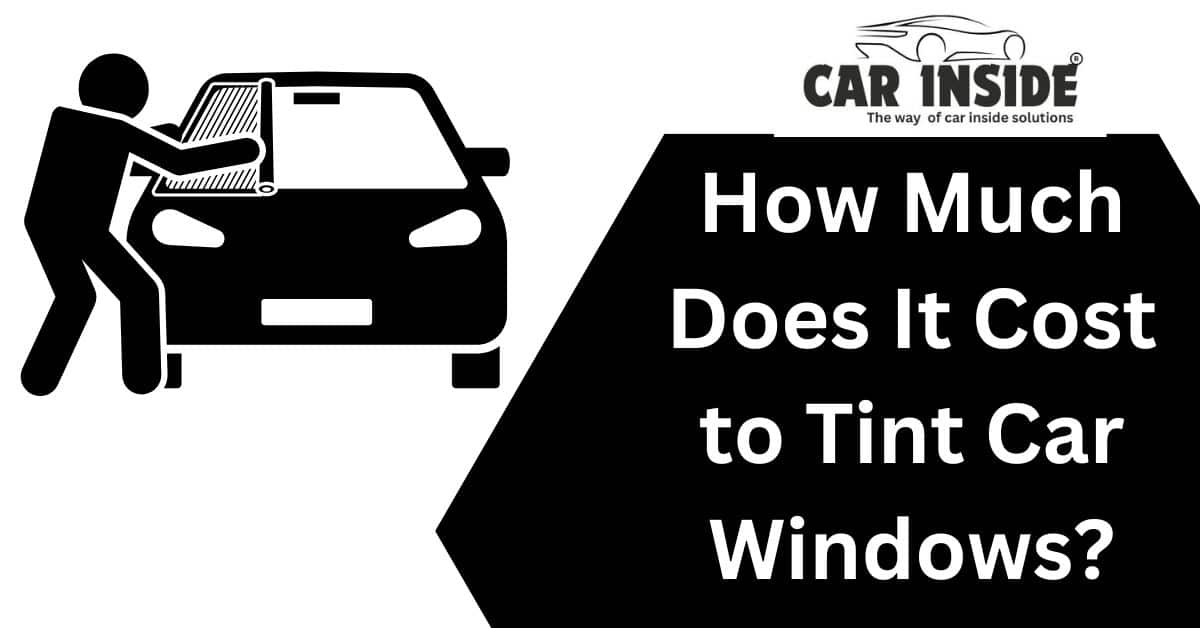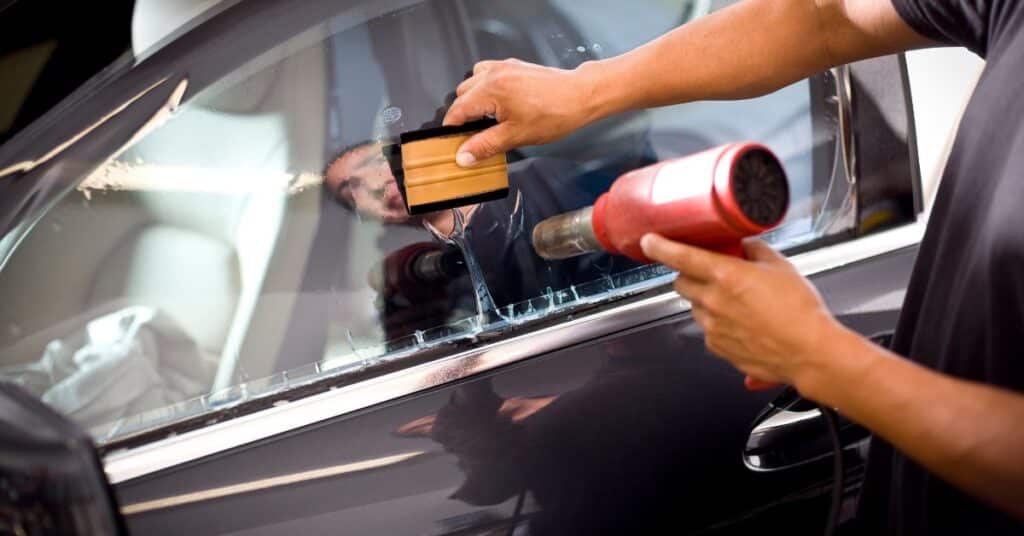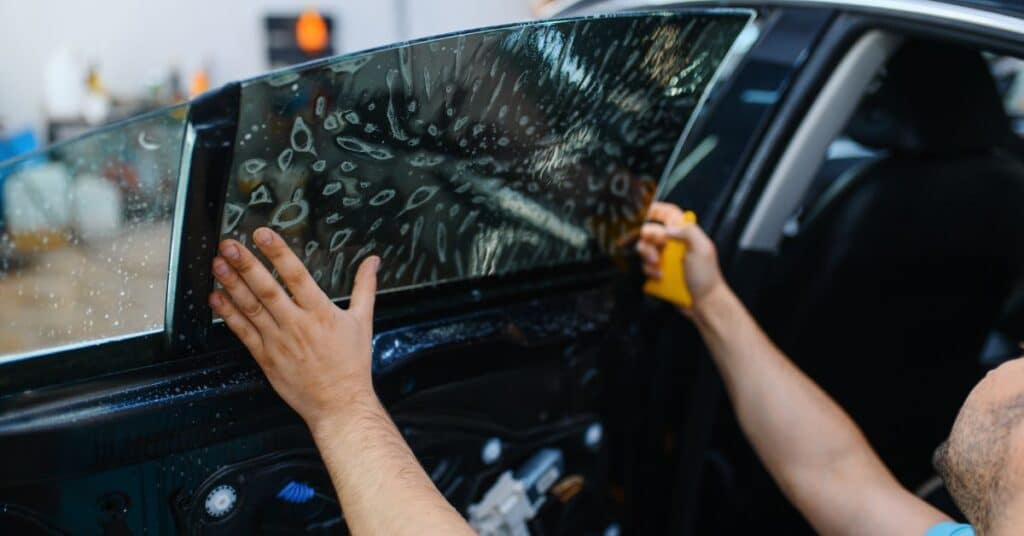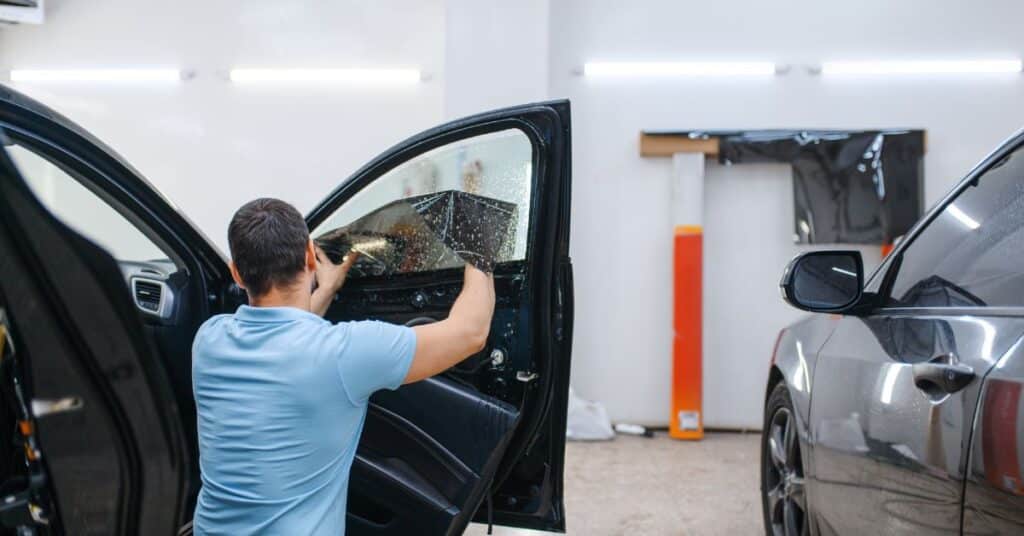How Much Does It Cost to Tint Car Windows?

Tinting your car windows is an awesome way to improve your car’s style, stay cooler, and protect your skin and interior from harmful UV rays. If you’re wondering how much does it cost to tint car windows?, this simple car inside guide will walk you through the details, prices, and benefits of window tinting.
How Much Does It Cost to Tint Car Windows?
Price Range: Tinting car windows costs between $50 and $800, depending on the type of film and vehicle size.
Types of Tint:
- Dyed Tint: $50–$150, affordable but fades over time.
- Carbon Tint: $200–$400, long-lasting and blocks ~40% heat.
- Ceramic Tint: $400–$800+, premium option with 99% UV protection.
Vehicle Examples:
- Two-door coupe: $120–$500.
- SUVs: $200–$1,000+.

Benefits of Tinting Car Windows
- Blocks up to 99% of UV rays.
- Reduces cabin heat by up to 50%.
- Improves privacy and protects car interiors.
Pro Tip
Check your state’s tinting laws to ensure compliance with Visible Light Transmission (VLT) limits.
| Type of Tint | Cost Range (Full Car) | Key Benefits | Drawbacks |
|---|---|---|---|
| Dyed Film | $50–$150 | Affordable, basic privacy, reduces glare, protects against minor UV rays | Fades over time, limited heat reduction |
| Metalized Film | $150–$300 | Durable, blocks heat and UV rays, provides a shiny appearance | Can interfere with GPS or radio signals |
| Carbon Film | $200–$400 | Long-lasting, no signal interference, reduces heat by ~40% | Costs more than dyed or metalized film |
| Ceramic Film | $400–$800+ | Blocks 99% of UV rays, reduces solar heat by ~50%, enhances clarity, doesn’t fade | Premium price |
| DIY Tint Kits | $20–$100 | Cost-effective for skilled DIYers | Risk of poor installation |
Additional Examples by Vehicle Type
| Vehicle Type | Basic Dyed Tint | Carbon Film | Ceramic Film |
|---|---|---|---|
| Two-Door Coupe | $120–$150 | $200–$300 | $400–$500 |
| Four-Door Sedan | $150–$200 | $250–$400 | $500–$700 |
| SUV or Large Vehicle | $200–$300 | $400–$500 | $700–$1,000+ |
What Affects the Price of Window Tinting?
The cost of car window tinting depends on a few key factors. Here’s what you need to know:
Type of Window Tint Film
There are several kinds of window tints, and their price depends on the material and features:
- Dyed Film: The cheapest option, costing around $50 to $150 for a car. It provides basic UV protection and privacy, but it can fade over time.
- Carbon Film: A mid-range option that blocks more sunlight and lasts longer. It’s priced between $200 and $400 and can block 40% of infrared radiation, reducing cabin heat.
- Ceramic Film: The best choice for heat rejection and UV blocking. It costs $400 to $800 and can block 99% of UV rays and up to 50% of solar heat.

How Many Windows You’re Tinting
Tinting a car with more windows or larger windows will cost more. For example:
- Two-door cars: $120–$450
- Four-door sedans: $150–$600
- SUVs or vans: $200–$800
DIY vs Professional Installation
- Professional Installation: Costs between $100 to $800, depending on the type of film and vehicle. Professionals offer a seamless finish and often provide warranties.
- DIY Kits: Cost between $20 and $100 and are great for those who want to save money, but the results may not be as polished.
Your Location
The average cost can vary based on where you live. For instance:
- In California, where heat rejection is crucial, ceramic tints can cost over $1,000.
- In smaller cities, prices for the same tint may be closer to $500.

Why Should You Tint Your Car Windows?
Window tinting isn’t just about looks it comes with plenty of benefits:
- Stay Cool Inside: Tints reduce heat by up to 50%, making your car more comfortable, especially during the summer.
- UV Protection: Blocks 99% of harmful UV rays, protecting your skin from sunburn and reducing the risk of skin cancer.
- Privacy and Security: Darker windows make it harder for people to see inside your car, keeping your belongings safe.
- Interior Protection: Tinted windows prevent your dashboard and seats from fading or cracking due to sunlight.
What Does the Law Say About Window Tinting?
Every state has its own rules for window tinting, based on Visible Light Transmission (VLT) percentages. Here are some examples:
- In Florida, the front windows must allow at least 28% of light, while the rear windows can go as low as 15% VLT.
- In Texas, front windows must have at least 25% VLT, but rear windows can be any darkness.
- Non-compliance can lead to fines ranging from $50 to $200 depending on the state.
Always check your state’s tinting laws before installing window film to avoid tickets!
How Much Will It Cost? Real-Life Examples
Here’s a quick look at typical costs for different vehicles:
- Honda Civic (sedan): Basic tinting starts at $150, while ceramic tinting can cost up to $600.
- Ford Explorer (SUV): A carbon tint might cost around $500, while a premium ceramic tint could exceed $800.
- Tesla Model 3: Due to its large glass areas, expect to pay between $600 and $1,200 for ceramic tinting.

Tips to Save Money on Window Tinting
- Compare Local Shops: Get quotes from at least three professional installers.
- Look for Promotions: Many shops offer seasonal discounts or special deals on bundles.
- Only Tint What’s Necessary: If you’re on a budget, consider tinting only the front windows or rear windows.
- Choose Mid-Range Films: Carbon tints offer great heat reduction and durability at a more affordable price than ceramic.
FAQs
Tinting your car windows can cost anywhere from $50 to $800 or more, depending on your vehicle, the type of tint, and your location. While cheaper films can get the job done, investing in a high-quality ceramic or carbon tint offers better protection, heat rejection, and durability.
Ready to upgrade your ride? Start by comparing quotes from local professionals or try a DIY kit for smaller projects. Either way, tinted windows are a smart, stylish addition to your car!






